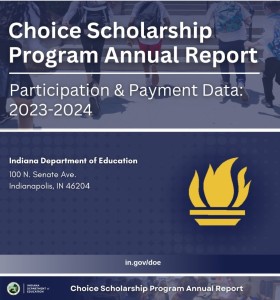Indiana’s 2023-24 voucher report is out, and the results are what we expected. The program, which provides state-funded tuition vouchers for students in private schools, got a lot bigger and a lot more expensive with legislation that made nearly all Hoosier students eligible.
It enrolled a record 70,095 students, a 31% increase over the previous year. And the cost to taxpayers ballooned to $439 million, some 40% higher than in 2022-23.
Republican legislators and then-Gov. Mitch Daniels created the program in 2011 with the sales pitch that it would help kids from low-income families escape “failing” public schools. As the program has expanded, they’ve long stopped pretending that was the point.
Today, vouchers have become a state subsidy for families that already send their children to private schools. According to the state report, two-thirds of voucher recipients in 2023-24 had never attended an Indiana public school. Most were not from poor families.
The average family income for a voucher student was $99,121, an increase of over 20% from the previous year. That’s well above the state’s median household income of about $67,000. Fewer than 9% of voucher students are Black, compared with 13.4% of public-school students.
Furthermore, there’s no evidence that attending a private school helps most students. Studies show that voucher students who switch from public to private schools, on average, fall behind academically, sometimes by a lot.
So why are we doing this? As West Lafayette lawyer-blogger Doug Masson writes, vouchers in Indiana are designed to “subsidize religion, weaken teachers’ unions and redirect public money to friends and well-wishers of pro-privatization policymakers.”
Public schools get public funding on the expectation that they will serve all students. In Indiana, private schools get public money with no such requirement. As an academic study titled “Dollars to Discriminate” found, they can reject students for their religion, disability, previous test scores, native language or because a student isn’t “a good fit.”
Heritage Christian School in Indianapolis, for example, received $5.6 million in voucher funding in 2023-24, the most of any school in the state. That’s almost $2 million more than it received the previous year, a nice windfall as a result of the state legislation.
According to its website, students who want to transfer there must have at least a 2.5 grade-point average and scores of “proficient” on Indiana’s ILEARN tests or comparable assessments. Students applying to grades 7-12 must “share their story of faith in Jesus Christ.”
Parents must agree to a “statement of faith” that affirms fundamentalist Christian beliefs and the literal truth of the Bible. Also, tuition is as high as $16,700. Vouchers typically cover only 40-50% of that, according to the school. Families may have to come up with the rest.
There’s arguably nothing wrong with having a school that’s off-limits to most students and that promotes sectarian views. What’s wrong is making you and me pay for it.

